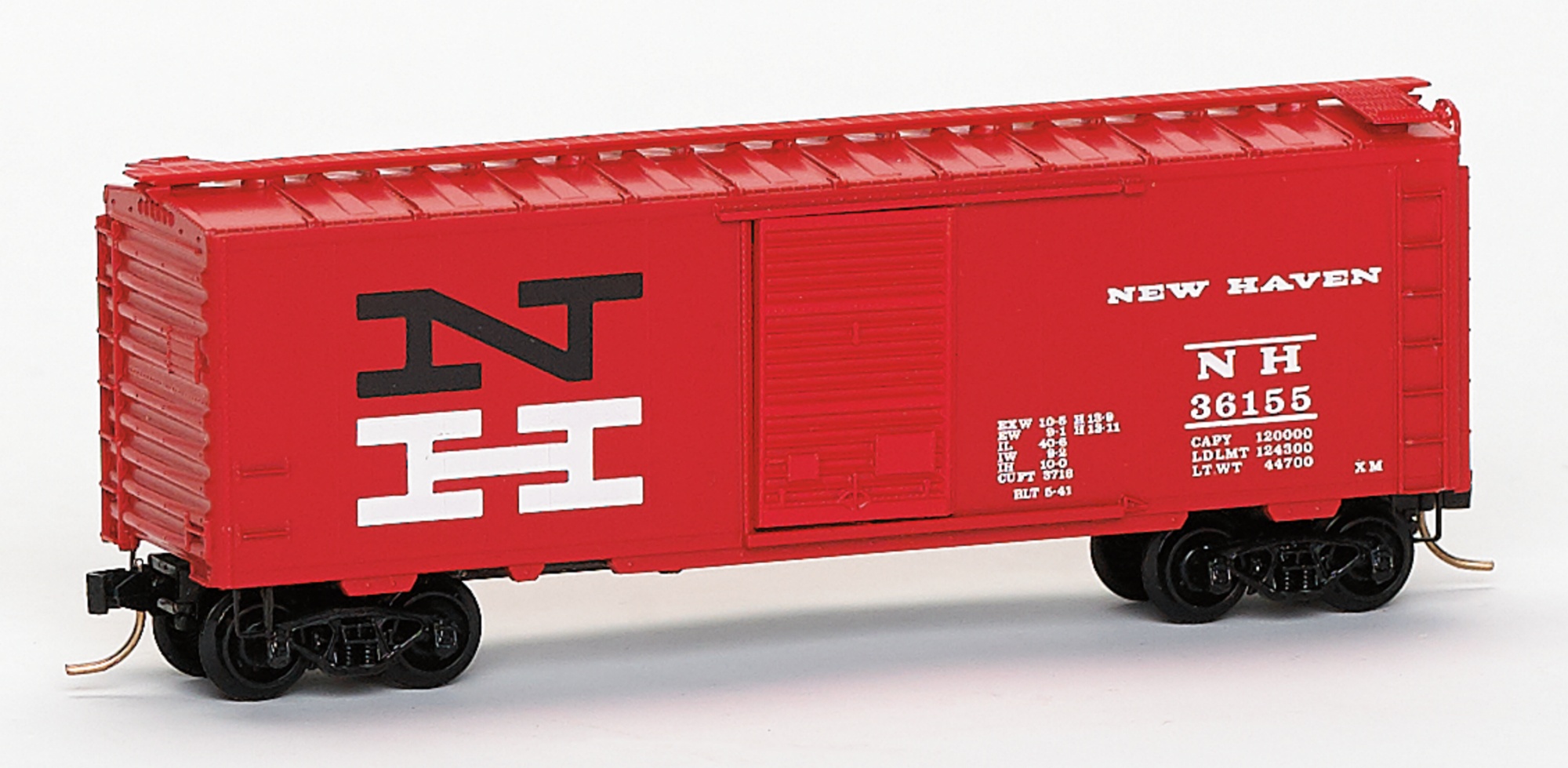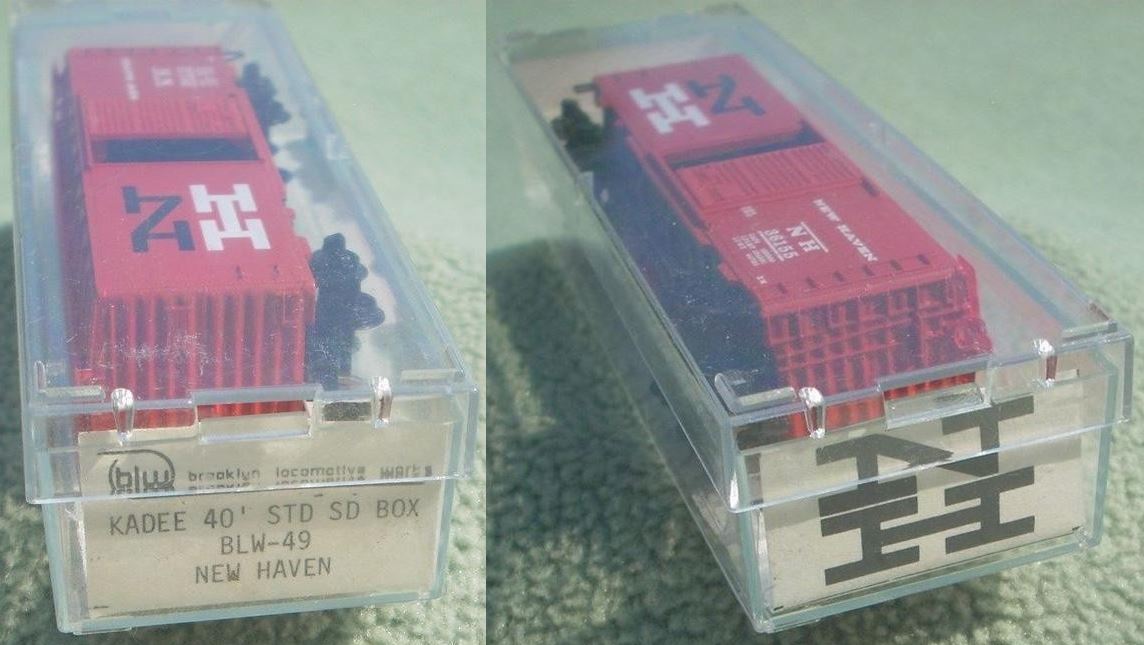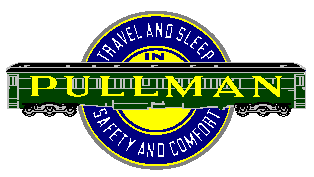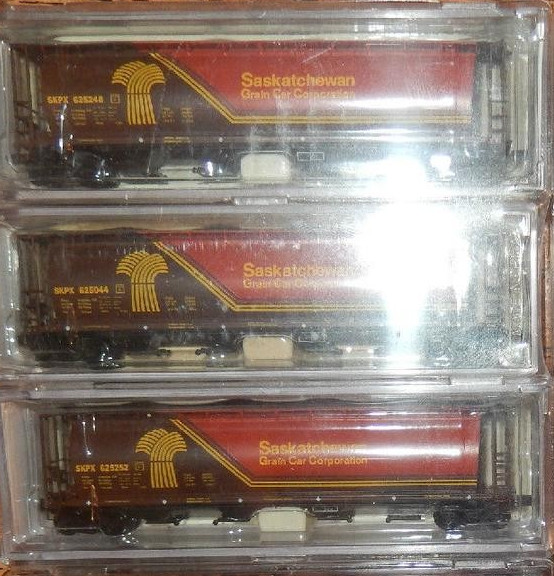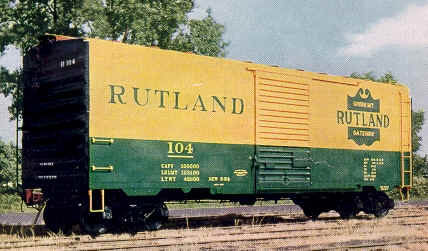Model Information: This is Micro-Trains first body style. It was introduced in 1972. Its is a model of a Pullman-Standard PS-1 boxcar from circa 1957. Micro-Trains does not market it as a PS-1 so as to allow themselves some latitude so they can use this car to model non-PS prototypes. Hundreds of different releases have used this body style in various paint schemes and road names. They are equipped with 6' sliding doors, either Youngstown (4/5/4 rib pattern) or Superior (7 panels). It is not a model of a "modern" steel boxcar as the length (40 foot) and the roofwalk are more typical of the transition era (1939 - 1957).
In 2019, Micro-Trains started releasing this model with new body-mounted couplers attached to a new underframe.
In 2019, Micro-Trains started releasing this model with new body-mounted couplers attached to a new underframe.
Prototype History: The 40' Boxcar is widely known as one of the most popular freight cars used by railroads as they transitioned from steam to diesel. In particular the Pullman Standard or PS-1 design was one of the most popular and was widely used by North American railroads. These boxcars were built beginning in 1947 and share the same basic design, with certain elements such as door size, door style or roof type varying among the different railroads and production years. When production of these cars ceased in 1963, over 100,000 had been produced.
So just what is a PS-1? Well the simple answer is it is any boxcar built by Pullman Standard from 1947 on. The design changed over the years – sometimes subtly, sometimes for customer request, and sometimes in a larger way. In general, most PS-1’s built from 1947 to 1961 share the same dimensions and basic construction techniques. These cars all had a length of 40′, a height of 10’5″ or 10’6″, welded sides and ends and roof of Pullman’s own design. The greatest variation was in the size and style of doors used. Pullman Standard also offered 50′ and later 60′ boxcars – also with the PS-1 designation.
So just what is a PS-1? Well the simple answer is it is any boxcar built by Pullman Standard from 1947 on. The design changed over the years – sometimes subtly, sometimes for customer request, and sometimes in a larger way. In general, most PS-1’s built from 1947 to 1961 share the same dimensions and basic construction techniques. These cars all had a length of 40′, a height of 10’5″ or 10’6″, welded sides and ends and roof of Pullman’s own design. The greatest variation was in the size and style of doors used. Pullman Standard also offered 50′ and later 60′ boxcars – also with the PS-1 designation.
Road Name History: 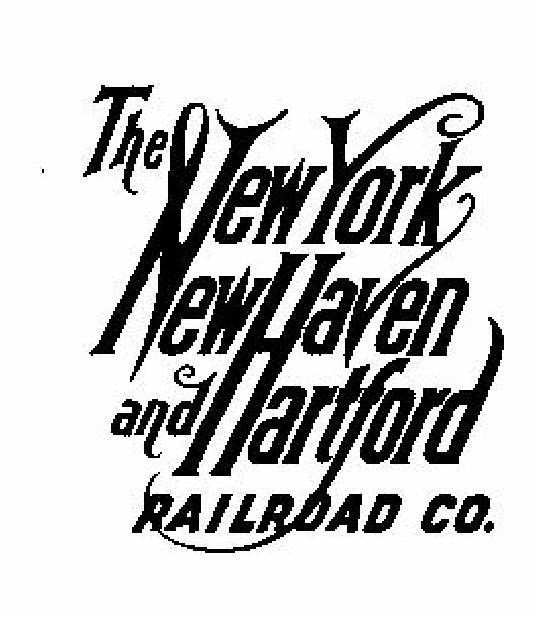 The New York, New Haven and Hartford Railroad (reporting mark NH), commonly known as the New Haven, was a railroad that operated in New England from 1872 to 1968, dominating the region's rail traffic for the first half of the 20th century.
The New York, New Haven and Hartford Railroad (reporting mark NH), commonly known as the New Haven, was a railroad that operated in New England from 1872 to 1968, dominating the region's rail traffic for the first half of the 20th century.
Beginning in the 1890s and accelerating in 1903, New York banker J. P. Morgan sought to monopolize New England transportation by arranging the NH's acquisition of 50 companies, including other railroads and steamship lines, and building a network of electrified trolley lines that provided interurban transportation for all of southern New England. By 1912, the New Haven operated more than 2,000 miles (3,200 km) of track, with 120,000 employees, and practically monopolized traffic in a wide swath from Boston to New York City.
This quest for monopoly angered Progressive Era reformers, alienated public opinion, resulted in high prices for acquisitions, and increased construction costs. Debt soared from $14 million in 1903 to $242 million in 1913, even as the advent of automobiles, trucks and buses reduced railroad profits. Also in 1913, the federal government filed an anti-trust lawsuit that forced the NH to divest its trolley systems.
The line became bankrupt in 1935, was reorganized and reduced in scope, went bankrupt again in 1961, and in 1969 was merged with the Penn Central system, formed a year earlier by the merger of the also bankrupt New York Central Railroad and Pennsylvania Railroad; Already a poorly conceived merger, Penn Central proceeded to go bankrupt in 1970, becoming the largest bankruptcy in the U.S. until the Enron Corporation superseded it in 2001. The remnants of the system now comprise Metro-North Railroad's New Haven Line, (parts of) Amtrak's Northeast Corridor, Shore Line East, parts of the MBTA, and numerous freight operators such as CSX and the Providence and Worcester Railroad. The majority of the system is now owned publicly by the states of Connecticut, Rhode Island, and Massachusetts.
Read more on Wikipedia and New Haven Railroad Historical and Technical Association, Inc.

Beginning in the 1890s and accelerating in 1903, New York banker J. P. Morgan sought to monopolize New England transportation by arranging the NH's acquisition of 50 companies, including other railroads and steamship lines, and building a network of electrified trolley lines that provided interurban transportation for all of southern New England. By 1912, the New Haven operated more than 2,000 miles (3,200 km) of track, with 120,000 employees, and practically monopolized traffic in a wide swath from Boston to New York City.
This quest for monopoly angered Progressive Era reformers, alienated public opinion, resulted in high prices for acquisitions, and increased construction costs. Debt soared from $14 million in 1903 to $242 million in 1913, even as the advent of automobiles, trucks and buses reduced railroad profits. Also in 1913, the federal government filed an anti-trust lawsuit that forced the NH to divest its trolley systems.
The line became bankrupt in 1935, was reorganized and reduced in scope, went bankrupt again in 1961, and in 1969 was merged with the Penn Central system, formed a year earlier by the merger of the also bankrupt New York Central Railroad and Pennsylvania Railroad; Already a poorly conceived merger, Penn Central proceeded to go bankrupt in 1970, becoming the largest bankruptcy in the U.S. until the Enron Corporation superseded it in 2001. The remnants of the system now comprise Metro-North Railroad's New Haven Line, (parts of) Amtrak's Northeast Corridor, Shore Line East, parts of the MBTA, and numerous freight operators such as CSX and the Providence and Worcester Railroad. The majority of the system is now owned publicly by the states of Connecticut, Rhode Island, and Massachusetts.
Read more on Wikipedia and New Haven Railroad Historical and Technical Association, Inc.
Brand/Importer Information: Brooklyn Locomotive works is a hobby shop that is located in Manalapan, New Jersey. Pete A. Postel founded BLW in 1979. They specialize in N Scale although they claim to cover other scales as well. In addition to serving as a volume discounter with competitive pricing for N Scale hobbyists, Brooklyn Locomotive works also often works with various manufacturers to create their own line of branded special runs. These special runs are usually only available through their retail operation (online or storefront). They also worked for a limited time in the early 1980s as a custom decorator. They bought undecorated kits from Micro-Trains and painstakingly custom painted and decaled a series of cars for collectors.
Manufacturer Information: 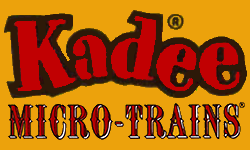 Kadee Quality Products originally got involved in N-Scale by producing a scaled-down version of their successful HO Magne-Matic knuckle coupler system. This coupler was superior to the ubiquitous 'Rapido' style coupler due to two primary factors: superior realistic appearance and the ability to automatically uncouple when stopped over a magnet embedded in a section of track. The success of these couplers in N-Scale quickly translated to the production of trucks, wheels and in 1972 a release of ready-to-run box cars.
Kadee Quality Products originally got involved in N-Scale by producing a scaled-down version of their successful HO Magne-Matic knuckle coupler system. This coupler was superior to the ubiquitous 'Rapido' style coupler due to two primary factors: superior realistic appearance and the ability to automatically uncouple when stopped over a magnet embedded in a section of track. The success of these couplers in N-Scale quickly translated to the production of trucks, wheels and in 1972 a release of ready-to-run box cars.
In October 1990 Kadee separated in two companies, with the newly created Micro-Trains® Line Co. continuing the Z, Nn3, and N Scale product ranges, with Kadee retaining the HO range.

In October 1990 Kadee separated in two companies, with the newly created Micro-Trains® Line Co. continuing the Z, Nn3, and N Scale product ranges, with Kadee retaining the HO range.
Commissioner Information: Brooklyn Locomotive Works was a hobby shop, specialized in N-scale, located in Manalapan, New Jersey, that also sells on-line. BLW regularly commissions special runs.
The company was founded by Pete Postel who announced that he would retired by end of 2018. His brother Paul should continue the business from his own shop Hogtrainz.com.
Brooklyn Locomotive Works (BLW) released special runs from various manufacturers under its own brand until approx. the mid-1980s. Thereafter the special runs where sold under the manufacturer's name and denoted as special runs for BLW. Hence in this database, we assign the BLW brand in the former case, and the original manufacturer's brand in the latter.
The company was founded by Pete Postel who announced that he would retired by end of 2018. His brother Paul should continue the business from his own shop Hogtrainz.com.
Brooklyn Locomotive Works (BLW) released special runs from various manufacturers under its own brand until approx. the mid-1980s. Thereafter the special runs where sold under the manufacturer's name and denoted as special runs for BLW. Hence in this database, we assign the BLW brand in the former case, and the original manufacturer's brand in the latter.
Item created by: gdm on 2018-07-24 15:36:23. Last edited by Alain LM on 2020-05-08 04:23:20
If you see errors or missing data in this entry, please feel free to log in and edit it. Anyone with a Gmail account can log in instantly.
If you see errors or missing data in this entry, please feel free to log in and edit it. Anyone with a Gmail account can log in instantly.


